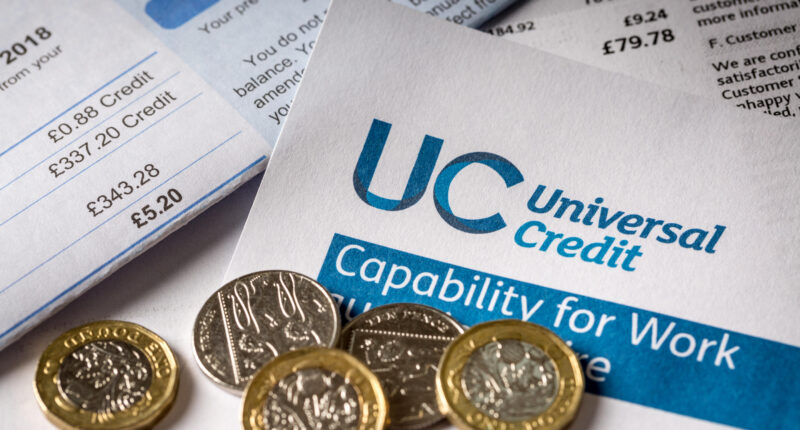HOUSEHOLDS on benefits will be affected by a major change this spring as they are moved away from the “legacy benefits” system.
From April, more benefit claimants on tax credits will be asked to claim Universal Credit instead.
Migration notices will be sent out to over 500,000 claimants currently in receipt of tax credits.
By migrating to Universal Credit, claimants will continue to receive the benefit they are entitled to through a modern benefits system.
Over two million people are still on old-style benefits like income support, but the government plans to move the majority of them onto Universal Credit by the end of 2024.
However, it’s moving back the managed migration of people from employment and support allowance to 2028.


The process began in May this year following a successful pilot in Harrogate, Yorkshire, in July 2019.
In most cases, individuals will be better off following a move from legacy benefits to Universal Credit.
However, where an individual’s Universal Credit payment is lower than their legacy benefits entitlement, they will usually be entitled to a top-up payment known as Transitional Protection.
This means that their Universal Credit entitlement will be the same as their legacy benefit entitlement at the point they move.
Most read in Money
Guy Opperman, minister for employment, said: “Universal Credit has proven itself as a benefits system fit for the modern age, having dealt with the unprecedented demand of 3.7million claims during the pandemic.
“The movement of those on legacy benefits to Universal Credit will ensure we can continue to provide the best level of support to benefit recipients through an effective and streamlined system.
“I want to encourage all those who receive their migration notices to take action to ensure that they continue to receive the benefits they are entitled to.”
There are two types of tax credits – working tax and child tax credit.
You can choose to move over to Universal Credit from tax credits at any time – but it is best to check before doing so as you might not be better off.
You should consider carefully what moving over means for your money, as you can’t move back once you’re on Universal Credit.
The government estimates that around 700,000 tax credit claimants could be better off.
But another 300,000 could be worse off, and should not move until invited as they could end up with less money.
Using an online benefits calculator can help you compare and are free and easy to use from charities such as Turn2Us and EntitledTo, and it’s also worth asking them for advice.
The move of claimants on legacy benefits to Universal Credit was paused during the pandemic following record demand so that DWP could process increased application volumes.
However, migration notices will now be issued to all tax credit claimants over the next two years.
Recipients who receive a migration notice and fail to act will risk losing their current benefit entitlements.
What is Universal Credit?
Universal Credit is a welfare scheme that was designed to combine a number of old “legacy benefits” into a single monthly payment.
Whether you are eligible will depend on your individual circumstances.
You may be eligible if you meet all of the following criteria:
- you’re on a low income or out of work
- you’re 18 or over (there are some exceptions if you’re 16 to 17)
- you’re under State Pension age (or your partner is)
- you and your partner have £16,000 or less in savings between you
- you live in the UK
Can I work if I claim Universal Credit?
Yes, it is possible to claim Universal Credit even if you are working.
You can use a benefits calculator to see how much you’re likely to get in total.
However as your income increases, your payment will reduce until you’re earning enough to no longer claim Universal Credit – then your payments will be stopped.
If you don’t tell the government about any changes you could incur a hefty fine.
You can find out exactly how much you can earn without reducing your payments or losing them altogether with our step-by-step guide.
How much is Universal Credit?
Universal Credit payments are made up of a standard allowance and then various additional payments that depend on your circumstances.
This is how much you will get as your standard allowance each month:
- Single, under 25 – £265.31
- Single, 25 or over – £334.91
- Couple, joint claimants both under 25 – £416.45 (for both of you)
- Couple, joint claimants, one or both 25 or over – £525.72 (for both of you)
You may get additional payments, for instance, if you:
- have children
- have a disability or health condition which prevents you from working
- need help paying your rent
It’s worth bearing in mind that Universal Credit payments will go up from this April in line with inflation for September last year.
That means payments will go up for millions by 10.1%.
So, if you’re single and under 25, your payments will go up to £292.11.
If you’re single and 25 or over, they’ll go up to £368.74.


Joint claimants who are both under 25 will see their payments go up to £458.51.
Plus, joint claimants where one or both of you are 25 or over will see their payments go up to £578.77.










